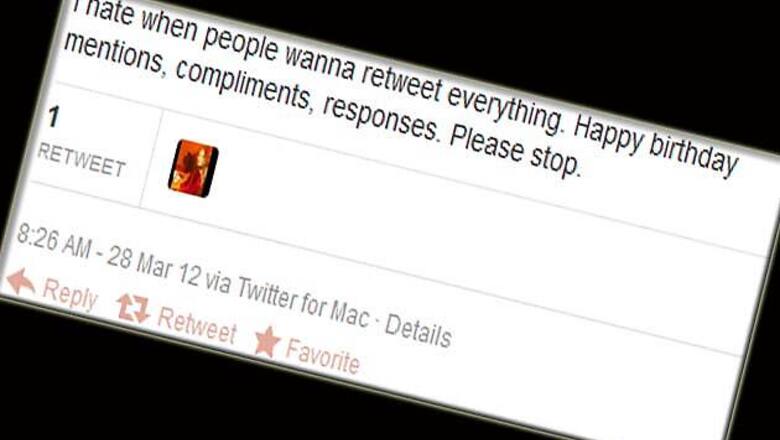
views
New Delhi: Twitter has been around for the last six years but I joined it six months ago exasperated at colleagues speaking in a seemingly foreign tongue. 'Followers', 'trolls', 'bots' and 'DP' had become water cooler conversation. "I'm nothing if not flexible," I said to myself and signed up for hell. Today, I'm not only a junkie but also an endorser of the subaltern democracy that the micro-blogging site offers to its reported 500 million users.
But in the labyrinth of opinions, rants, comments and endorsements, is a wonderful political system that allows the smooth dissemination of knowledge and decentralization of power. It begins at a very basic level - the retweet.
In 2009, before Twitter incorporated a built-in button for retweet - or sharing of someone else's tweet with ones' followers - the traditional RT followed by the Twitter handle of the user whose tweet you wanted to share allowed space for comment and opinion. There is a succinct blog post from one of Twitter's cofounders explaining the differences between using a manual RT and the retweet link in each post.
Before rolling out the new retweet feature, Evan Williams said: "Retweeting is a very cool thing that emerged organically from Twitter users as a way of passing on interesting bits of information. People have long asked when we're going to build a RT button on twitter.com. While it would have been pretty trivial to do the way some clients have, the reason it's taken a while is because we wanted to do something a little more fundamental that we thought would add a lot more value." Read the rest of the post here.
'Retweet does not mean endorsement'
In the past six months I found out that's complete bulls**t. You would not take an argument further unless you have a personal investment in it in some way or the other. Either you mentally nod at what the user says or you find it interesting enough to share with your followers. In the real world it's the equivalent of hollering: "Oi! See what this guy is saying."
In certain cases retweeting simply means stoking an already raging fire. In September, 2009, Congress leader Shashi Tharoor replied to a journalist's jovial query on whether he will travel 'cattle class' with a tongue-in-cheek tweet of his own: "cattle class out of solidarity with our holy cows". The innocuous tweet shared by many on the site created a storm in the media eventually leading to Prime Minister Manmohan Singh's intervention and Tharoor's explanation for a joke that was interpreted by the old guards of the party as a dig at its austerity policies. The scores who retweeted opinions and jokes made by hundreds of users on the Tharoor incident ensured that the controversy did not die a natural death.
"Dude you stole my tweet!"
I was talking to stand-up comedians Tanmay Bhat and Gursimran Khamba the other day and they made the interesting and topical point. "It your tweet gets retweeted 100-plus times, consider it stolen. It's no longer your property," Bhat said. Khamba added: "We have stopped caring about this long ago." Bhat and Khamba have over 12,000 and 20,000 followers respectively on Twitter.
Jokes made on Twitter will follow you home on your Facebook wall, Blackberry Messenger and mobile text messages. There are no intellectual property rights that govern the tweet mafia. It is very difficult to trace the origin of a tweet if it gets retweeted 300-400 times, especially by those who do not credit the source. Some find it on search and share it using double quotation marks to attribute it vaguely and improperly to one of the million anonymous sources on the site.
"Unless you're a celeb, you won't retweet someone who has 12 followers"
The wonderful, wonderful truth about Twitter is that anyone, from the pizza delivery boy to the eccentric pop star with a gazillion followers, can be a Twitter celebrity if they have what it takes to become one. It could be someone with a good sense of humour, a hard-hitting political analyst, a foulmouthed idiot, a controversial starlet, a caustic news reader, a reformed nudist or even a user posing as a cat (don't ask).
But the complex politics that govern Twitter play a big part in the retweet policy. Why is a retweet so important to some people? A. Mainly, it helps in adding followers (if the person retweeting has a large follower count). B. It is an endorsement of his/her opinion. C. It helps in reaching out to a wider audience base.
If you notice, those popular on Twitter are more inclined towards retweeting someone with a considerable follower count. If you have over 1000 followers, you will converse mostly with those with 2000 to 10000 followers for a better chance at getting a reply and a retweet. Regular 'mentions' establishes trust between you and the people you follow. This system is of course is as fragile as a recovering alcoholic's promise to stay away from the bottle.
A personal attack is the surest way of breaking this trust. Those in the exclusive club of 100K plus followers are in the unique position of both getting heavily trolled for their opinions and as well as getting hundreds of daily requests for retweets.
"It's my birthday, please retweet
I have scoffed at this on Twitter and I will do the same again here. My irony meter simply explodes (again, expression borrowed from Twitter) when I see celebrities retweeting people who send out this strange request. A celebrity retweet has replaced traditional gifts and wishes from friends. I have no doubt in my mind that most of the people making this request to celebrities are lying through their teeth. I often wonder if seemingly intelligent celebrities acquiesce to these requests out of kindness or sheer pigheadedness.
Political ideologies behind a retweet
Often political ideologies play a big role in retweeting. Someone cracked a joke on BJP leader Nitin Gadkari's fall during a rally, I retweeted. Big mistake. In minutes both the original source of the tweet and I were bombarded with abuses from users whom we refer to as trolls on Twitter. I am generally apolitical and I assume so is the source. None of us retweeting the joke had any ulterior motive beyond just sharing a guffaw at the sheer ridiculousness of the situation. I would have cracked a joke with equal relish had Rahul Gandhi slipped and fallen from a dais. But I was branded as anti-right wing and pleas were sent out to others to block me. I recently got a solemn message from a follower "Unfollowing you, goodbye" for a similar wisecrack.
But the fairness of the medium never fails to amaze me. While in real life you cannot block your local councillor for statements you consider offensive, here you can. Fair enough. My six-month probation period on Twitter is over and I'm now on its rolls (or should I say trolls?). If I have understood anything, it's using the power of retweet that the site invests in us wisely.



















Comments
0 comment